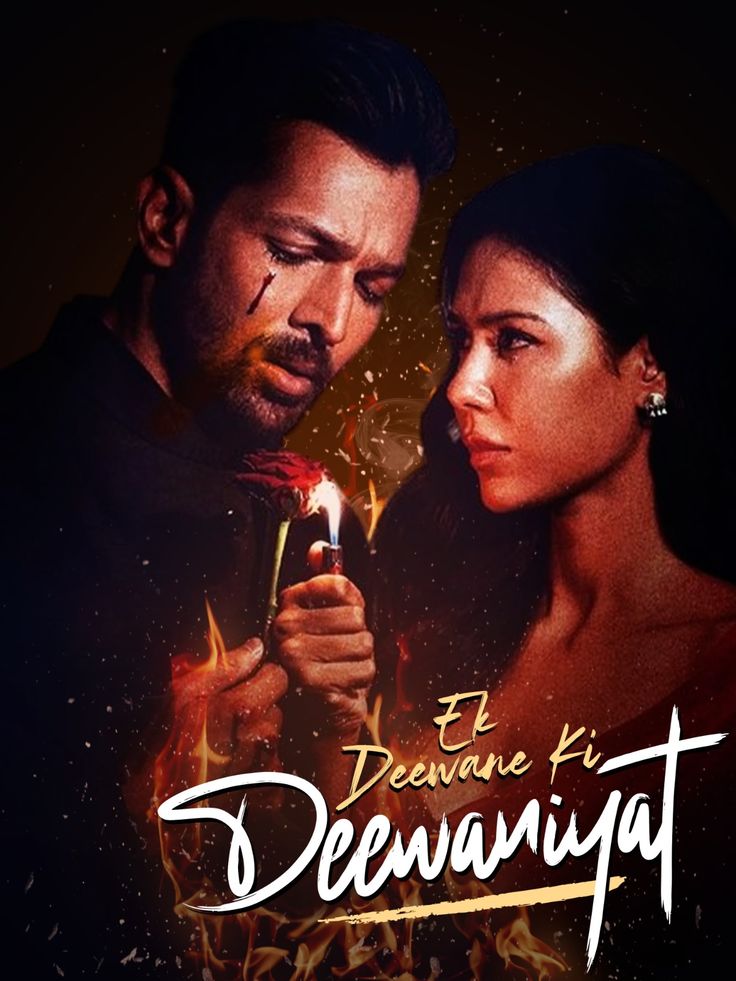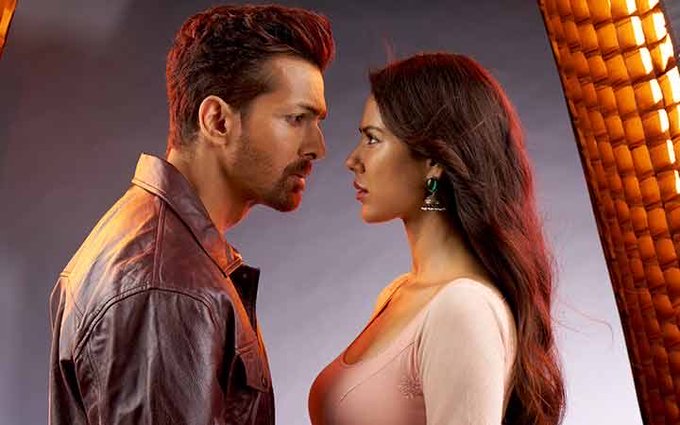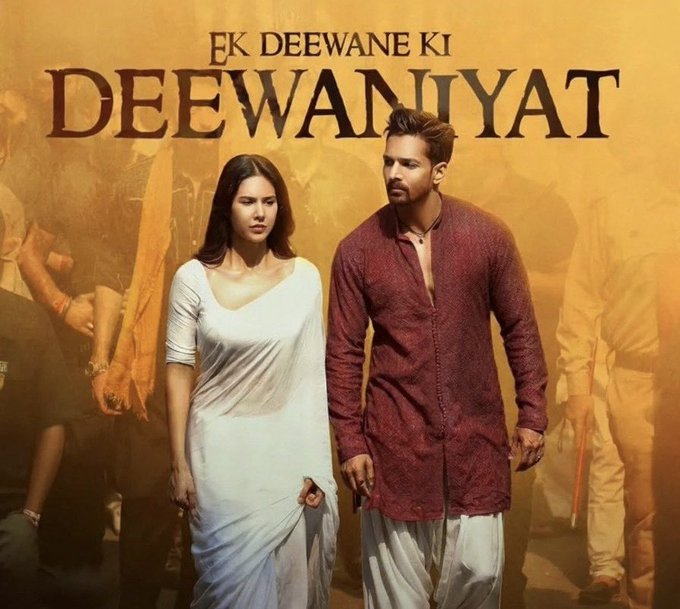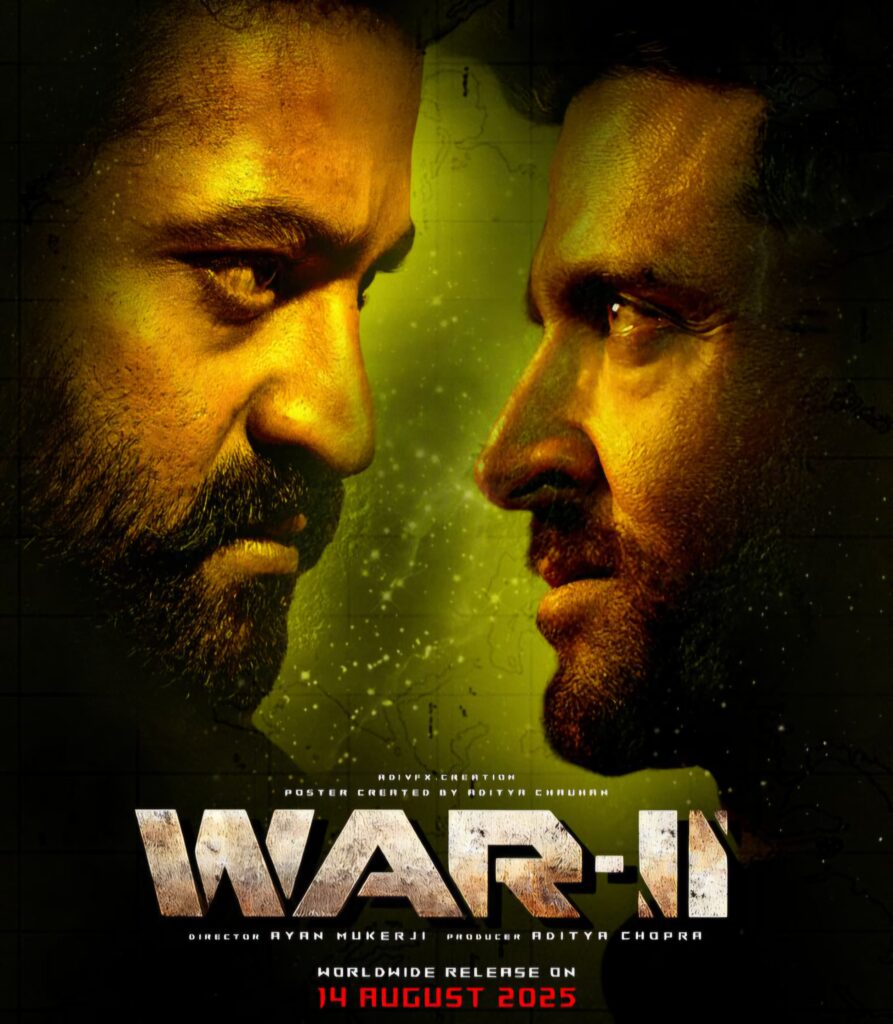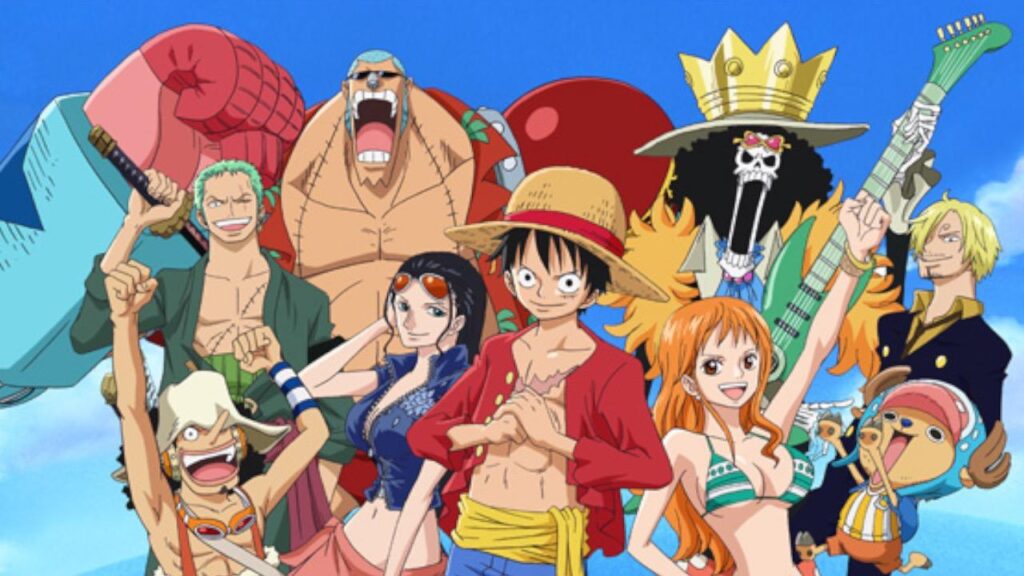The festive season of Diwali has once again brought with it a wave of cinematic sparkle and among the most talked-about releases this week is “Ek Deewane Ki Deewaniyat.” Starring Harshvardhan Rane and Sonam Bajwa, this romantic-drama attempts to blend passion, obsession, heartbreak, and politics into a single explosive cocktail of emotions.
Directed by Milap Milan Zaveri, the film positions itself as a modern-day love saga intense, glamorous, and drenched in fiery dialogue. But does it succeed in standing out amid a crowded box office? Let’s dive deep into what makes Ek Deewane Ki Deewaniyat both a compelling and occasionally frustrating cinematic experience.
A Love Story Born from Power, Glamour, and Ego
The story revolves around Vikramaditya Singh (Harshvardhan Rane) a young, dynamic politician whose charisma and ambition make him a rising star in his state. Used to having control in every sphere of life, Vikramaditya’s world turns upside down when he meets Adaa Kaur (Sonam Bajwa), a successful actress who lives by her own rules.
Their paths cross at a charity event, where an instant spark sets the screen ablaze. What begins as admiration soon transforms into obsession a love that promises paradise but edges toward destruction. Adaa sees love as freedom, while Vikramaditya views it as possession. Their contrasting beliefs become the heartbeat of the film.
As their relationship deepens, politics, media scrutiny, and ego begin to pull them apart. When betrayal enters the picture, love turns to revenge leading to an emotional climax that’s both poetic and tragic.
Harshvardhan Rane: The Heart and Soul of the Film
Harshvardhan Rane, best known for his intense performances in Sanam Teri Kasam and Taish, carries Ek Deewane Ki Deewaniyat entirely on his shoulders. His portrayal of Vikramaditya is commanding he exudes power in the political scenes and vulnerability in the romantic ones.
Rane’s screen presence is magnetic. Whether it’s his smoldering gaze or the inner turmoil of a man losing control over love, he brings a believable complexity to the character. Early reviews and audience feedback praise him for “living the role rather than just playing it.”
If there’s one critique, it’s that the script occasionally confines him to melodrama particularly in scenes designed to showcase his rage rather than his emotional depth. Still, Rane emerges as the film’s biggest strength.
Sonam Bajwa Shines as the Free-Spirited Adaa
After winning hearts in Punjabi cinema, Sonam Bajwa steps into Bollywood’s emotional arena with elegance. Her portrayal of Adaa Kaur a woman who refuses to be defined by anyone adds a modern touch to the story.
She’s radiant in every frame, balancing glamour with grace. Adaa’s character isn’t just a love interest; she’s a symbol of independence. In scenes where she confronts Vikramaditya’s controlling nature, Bajwa shines with quiet defiance.
However, the screenplay gives her limited room to explore Adaa’s inner conflicts beyond the romance, leaving viewers wishing for more emotional exploration. Yet, Sonam Bajwa’s charm and sincerity make Adaa one of the most memorable aspects of Ek Deewane Ki Deewaniyat.
Milap Milan Zaveri’s Direction: Grand Vision, Uneven Execution
Director Milap Milan Zaveri, known for his flair for dialogue and larger-than-life emotions, clearly envisioned Ek Deewane Ki Deewaniyat as a tribute to the old-school Bollywood love saga full of passion, poetry, and heartbreak.
The film’s first half builds up the romance with style and tenderness. The settings are lavish from rain-soaked rooftops to candlelit parties and the chemistry between the leads keeps the story engaging.
But as the second half arrives, the narrative shifts gears into intense melodrama. The transitions between love and hate, passion and politics, are often rushed. At times, the film feels more like a series of musical montages and dramatic outbursts than an organically evolving story.
Zaveri’s strength lies in his ability to make emotions feel larger than life but this time, the emotional logic doesn’t always keep pace with the spectacle.
Still, credit must be given for his attempt to revive the pure, unapologetic Bollywood romance something audiences rarely see in today’s more restrained storytelling landscape.
Cinematography and Visual Appeal
If there’s one thing that makes Ek Deewane Ki Deewaniyat visually irresistible, it’s Nigam Bomzan’s cinematography. The film is drenched in golden hues, luxurious interiors, and scenic outdoor sequences that amplify its romantic mood.
Each frame looks designed for the big screen. Whether it’s the intimate close-ups of the leads or the grand rallies showcasing Vikramaditya’s political power, the visual palette speaks of ambition and flair.
However, there are moments when style overtakes substance. Certain scenes feel like high-end music videos stunning to look at but disconnected from the emotional flow. Still, for viewers who appreciate visual cinema, Ek Deewane Ki Deewaniyat delivers plenty of aesthetic pleasure.
Music: The Beating Heart of the Story
One of the strongest pillars of Ek Deewane Ki Deewaniyat is its music. The soundtrack, composed by a team of leading contemporary artists, blends soulful melodies with high-energy romantic tracks.
Songs like “Dil Dil Dil” and “Ishq Ka Jadoo” have already become chartbusters, dominating streaming platforms. The background score, with its haunting violin riffs and rhythmic heartbeat sounds, heightens the emotional intensity of key scenes.
Music plays an integral role in storytelling here often conveying emotions that dialogues fail to express. The film’s musical interludes are strategically placed, ensuring that each song feels like a natural extension of the plot rather than an interruption.
Editing and Pacing
Edited by Maahir Zaveri, the film runs for just over two and a half hours a length that could have easily been trimmed by twenty minutes.
The first half takes time to find its rhythm, with the setup focusing heavily on glamour and flirtation. The second half, while more gripping, occasionally drags with repetitive emotional confrontations.
If the pacing were tighter, Ek Deewane Ki Deewaniyat might have hit harder. Still, the climactic 20 minutes bring everything together — with emotional payoff and visual grandeur that leave a lasting impression.
Dialogues: Theatrical but Impactful
One cannot talk about a Milap Zaveri film without mentioning the dialogues and this one doesn’t disappoint.
Lines like “Pyaar mein sach aur jhoot nahi hota, sirf jazbaat hote hain” (“In love, there’s no truth or lie, only emotions”) are delivered with intensity and flourish.
While some critics find the dialogue delivery overly dramatic, others appreciate the throwback to classic Bollywood romanticism. It’s the kind of writing that makes audiences cheer, whistle, and occasionally tear up especially those who grew up on 90s love stories.
Themes and Emotional Core
At its heart, Ek Deewane Ki Deewaniyat explores one timeless theme: when does love cross the line between passion and obsession?
Vikramaditya’s character represents the power struggle inherent in many modern relationships a man who believes love is about possession and control. Adaa, in contrast, embodies freedom and individuality. Their love story becomes a mirror reflecting contemporary gender dynamics and emotional dependencies.
The film asks uncomfortable questions Can love survive without equality? Can power and passion coexist? Though it doesn’t answer all of them effectively, its attempt to raise them is commendable.
Audience Reactions: Divided but Engaged
As soon as Ek Deewane Ki Deewaniyat hit theatres, social media lit up with mixed reactions.
Fans of Harshvardhan Rane praised his intense performance, calling him “Bollywood’s new king of romance.” Sonam Bajwa’s fans flooded Twitter with praise for her beauty and grace.
However, many viewers found the film’s story predictable and melodramatic. Some called it “a beautiful film stuck in an outdated format,” while others described it as “a throwback to the passionate love stories of the early 2000s.”
Despite the polarizing reviews, there’s no denying that the film has struck an emotional chord among romantics. Many couples took to social media to share that they found parts of the film “relatable and heartfelt.”
Box Office Outlook: Riding on Festive Sentiment
Released during the Diwali weekend, Ek Deewane Ki Deewaniyat faces tough competition at the box office — notably from Ayushmann Khurrana and Rashmika Mandanna’s “Thamma.”
However, the film’s advantage lies in its music and emotional appeal to Tier-2 and Tier-3 audiences. Trade analysts predict that the movie may see strong footfall in smaller cities and multiplexes where traditional romance still draws crowds.
The opening day collections were reported to be moderate but steady, with an expected weekend jump due to positive word-of-mouth about its music and performances.
Comparisons with Past Romantic Dramas
Cinephiles have already begun comparing Ek Deewane Ki Deewaniyat to earlier Bollywood love sagas like Aashiqui 2, Kabir Singh, and Sanam Teri Kasam.
Like Kabir Singh, this film portrays an intense lover consumed by passion and ego. But unlike the toxic masculinity criticized in Kabir Singh, Ek Deewane Ki Deewaniyat attempts to balance the gender dynamics through Adaa’s strong character.
In tone and visual aesthetics, it’s closer to Aashiqui 2 — rich in music, tragedy, and emotional scale. It might not redefine the genre, but it successfully reminds audiences why classic romantic dramas still hold such cinematic charm.
Critical Analysis: Strengths and Weaknesses
Strengths
- Powerful performances from both leads
- Soulful music that enhances emotional depth
- Lavish visuals and stylish cinematography
- Strong emotional themes that resonate with lovers of classic romance
Weaknesses
- Predictable storyline with familiar tropes
- Over-the-top dialogues at times
- Slow first half and stretched runtime
- Inconsistent tone, oscillating between modern realism and old-school melodrama
Despite these flaws, the film’s heart is in the right place. It doesn’t shy away from emotional excess and that’s precisely what gives it character.
Final Verdict: A Heartfelt Journey with Familiar Twists
Ek Deewane Ki Deewaniyat is not perfect — but it’s sincere. It may stumble in pacing and originality, but it wins through emotion and earnest performances.
For viewers yearning for old-school Bollywood romance — where love means poetry, heartbreak, and passion on grand scale — this film delivers. For those seeking subtlety and innovation, it might feel dated.
Nevertheless, in an era dominated by thrillers and biopics, Milap Milan Zaveri’s film dares to celebrate love with unapologetic drama and that deserves applause.
- Final Rating: 3 out of 5 Stars
- Verdict: A visually stunning, musically rich romantic drama that celebrates love’s madness and pain with old-world charm. Watch it for Harshvardhan Rane’s fiery performance and Sonam Bajwa’s irresistible screen presence.
Related News: Read More

